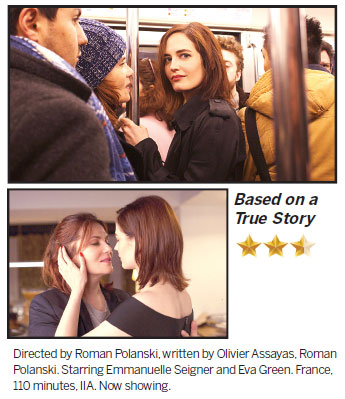Time's definitely up
Updated: 2018-06-22 07:03
By Elizabeth Kerr(HK Edition)
|
|||||||
In this era of #MeToo and Time's Up, what exactly constitutes a bridge too far? Can we collectively appreciate an artist's work while also collectively condemning his (it's usually his) behavior? This is the quagmire Hollywood and dozens more industries around the world started wading into last fall when the Harvey Weinstein scandal erupted.
French-Polish director Roman Polanksi, as a result, made headlines again. Perhaps the best-known sex offender in moviedom, dodging arrest in the United States for 40 years, Polanski was convicted of statutory rape in 1978. Like Woody Allen, who's under the gun for the alleged abuse of his stepdaughter, Polanski has his defenders. In the years since his conviction he's worked with Harrison Ford, Hugh Grant, Sigourney Weaver, Ben Kingsley, Adrien Brody, Johnny Depp, Ewan McGregor, Pierce Brosnan, Jodie Foster and Kate Winslet. Which again raises the question: Should we judge the man or his work?
Everyone will draw a line in the sand for him or herself and those lines will be all over the map. But in Polanski's case, the director is making the choice for us. His last truly great film was Frantic in 1988, and his latest, Based on a True Story, based on Delphine de Vigan's novel D'aprs Une Histoire Vraie, is far, far from that. In Story, an emotionally fragile writer, Delphine (Emmanuelle Seigner, who is also Polanski's wife), is struggling to follow up her intensely personal bestseller as well as cope with a series of anonymous letters accusing her of humiliating her family in it. Cursed with writer's block, she meets Elle (the fabulous Eva Green), a copywriter who steps into every gap in Delphine's life. Smart, sensitive and assured, Delphine finds herself connecting with the mysterious Elle before things turn upside down.
There's a good movie about art and dependency in here somewhere, buried beneath the many, many elements cribbed from the likes of Misery, Single White Female, and Polanski's own The Ghost Writer. Co-writer Olivier Assayas (Personal Shopper, Clouds of Sils Maria) is perfectly capable of writing fully realized, complex relationships between women, and so it seems Polanski has dropped the ball in translating it to the screen, substituting lush European countryside, chic Paris flats and untethered imagery for theme. Between the overwrought plot points (Delphine's tumble down the stairs will break you), lapses in common sense and eye-rolling coincidences, the film is a hot mess. It is entertaining though, even if for the wrong reasons. The director in Polanski may have lost his way when it comes to the nuances that made Chinatown and Rosemary's Baby such classics, but he still knows how to move a story. How much you want to reward the man, however, has never been a more personal, and political, choice.

(HK Edition 06/22/2018 page11)